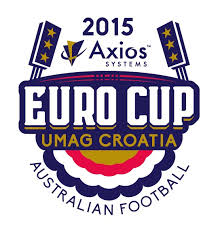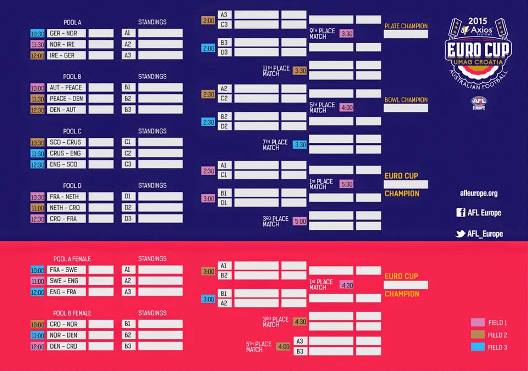Historical Guide To The Euro Cup
- Friday, October 09 2015 @ 01:23 pm ACDT
- Contributed by: Wesley Hull
- Views: 2,906


The reality is that the best prepared and performed team on any given day, at any given event, will take home the titles. The talent and determination in the team list will go a long way to deciding events as will the collective desire to focus for the sustained periods required and get the job done.
But can past performance be used as a guide to how the teams will go at this year’s Euro Cup in Umag, Croatia. This is far from an exacting science, but it does make an interesting exercise to see what journeys each nation has been on in the preceding years.
Following is a team by team analysis of past performance as a guide to how they might perform at this year’s Euro Cup.
DENMARK:
This team will be hard to beat again in 2015. Having won the championship last year in London they are the reigning title holders. The Danes were not at the 2013 event in Bordeaux, but they performed brilliantly in Edinburgh back in 2012, going down to the Irish team in the Grand Final by just one point. They have also proved that home ground advantage for host teams means nothing to them so will not fear Croatia if they both reach the final. Look to Denmark to be the team to beat again.
CROATIA:
The nation has the advantage of home soil which will help their cause, but it is their history at the Euro Cup which says much about the development of the national team as a force in the game. Since 2008 they have only once missed out on a top three finish – in 2012 when they lost a quarter final to Denmark – and are primed to take the title again. First place in 2010, runners-up in 2008, 2011 and 2014 and third place in 2009 and 2013 sees them as one of the most consistent nations at the Euro Cup. Will be right up there with Denmark to fight for the title.
ENGLAND:
Fifth place in 2005 and sixth in 2014 doesn’t tell the story. From 2006 to 2013 the England side was also highly consistent and successful winning the title in 2008, 2009 and 2013, third in 2007, 2011 and 2012 and a fourth place in 2010. Took the title in Bordeaux in 2013 and will be a strong show again this year with many of that team still around as well as an influx of new talent. Certainly a dark horse for this event.
IRELAND:
Back to back titles in 2011 and 2012 saw the Irish become a power of Aussie Rules footy in Europe after finishing third in 2010. Lost a pool match to France in 2013 by just one point in possibly the upset of the tournament and finished fifth overall before coming back hard for third place last year in London. On the way back up and very capable of pulling of an upset of their own, so will need to be respected in Umag.
FRANCE:
After many years sitting in and around the quarter finals stage of the Euro Cup, then contesting the Euro Bowl in 2010 and 2012 (winning in the latter), the French made their greatest breakthrough in 2013 in Bordeaux, reaching the Grand Final against England. They defeated Austria to take the 2014 Euro Bowl and overall ninth place. Unlikely to take title, but have the history to suggest they could go a long way this year, even a smokey for the semi-final stage.
GERMANY:
Runners-up in 2007 and third in 2008, the German team has spent a number of years either absent from the event (2013) or further down the pecking order around the 6th to 12th range. However, powered through last year’s event to reach the semi-finals and take overall fourth place. Certainly proved they have the ability to go far and will be watched with interest. Certainly a chance for semi-finals or even Euro Bowl champions.
SCOTLAND:
Grabbed silverware in consecutive years in 2009 (Euro Plate) and 2010 (Euro Bowl), but of late have not been high up on the pecking order. Always a great chance of repeating their 09/10 results and grabbing another trophy, but unlikely to threaten for the top echelons.
NORWAY:
After just three years in the world of the Euro Cup, the Norwegians have had a remarkable start. Winning the Euro Plate in their debut year (2012) and backing it up with another plate last year, the Norway team has already proven they belong in this company. An 11th place finish in Bordeaux in 2013 is their highest result but they will be hoping to better that again this year. But another plate to fill their trophy cupboard would not go unappreciated.
AUSTRIA:
Having been a perennial cellar-dweller for many years, the Austrians have certainly turned the corner in the past couple of years. With a previous best in 2005 of 9th place (of 9 teams), the Austrian team finished 9th in Bordeaux in 2013 to take out the Euro Plate and followed up last year with an overall 10th place to be runners-up for the Euro Bowl. The signs are very encouraging that the work done in Austria is paying off and they would be delighted with another piece of silverware in Umag.
THE NETHERLANDS:
The early years of the Euro Cup saw a powerful team from The Netherlands finish third in 2005 then back to back runners-up in 2009 and 2010. Since then the Dutch team has dropped alarmingly in performance and missed the tournament altogether in 2012/13. But they returned last year to finish 15th overall in London and may well surprise this year as they continue to rebuild.
EUROPEAN CRUSADERS:
A team which changes in makeup each year depending on the players who become available, the Crusaders have occupied the lower rungs of the ladder. Their best results were in 2009 when they were runners-up in the Euro Plate final and ninth place in Belfast in 2011. They are unlikely to do huge damage at the event but always a chance of stealing a plate.
PEACE TEAM:
Unknown, untried and unlikely to figure very high in most people’s predictions. But the Peace Team are in a position to surprise everyone. There is no track record to base form on and a large number of their players have little background in the game, but like previous efforts from teams like Norway, Iceland and Russia, they might finish higher than expected with just a win here or there. This team will certainly be very interesting to watch.
WOMEN’S COMPETITION:
Between 2010 and 2013 the Women’s tournament was held between just two competing teams. The Irish Banshees women’s team won the event in 2010, 2011 and 2012 against Italy, Switzerland and a European Crusaders team respectively. The 2013 event in Bordeaux featured a combined European Crusaders team beating the home nation. Last year, for the first time, the women’s draw grew to five teams with the Banshees joined by first timers England, Denmark, Scotland and France teams. Again, the Banshees took the title.
This year’s Women’s event has been blown wide open with the Banshees not coming to Umag. New teams from Sweden and Norway will compete as will a Croatian women’s team for the first time. Favouritism would appear to rest with the three teams from last year – the England Vixens, Denmark Valkyries and France Les Gauloises, but the Croatian team will be hugely keen to perform well in front of a home crowd and may surprise.
As stated initially, the elements which will decide the event will be the performances of teams and players on the day. But if history can be any guide, many teams have demonstrated levels of success in past and recent years which give a pointer to what may happen this weekend in Umag.
2015 Axios Euro Cup Draw



 RSS news
RSS news Twitter
Twitter Facebook
Facebook